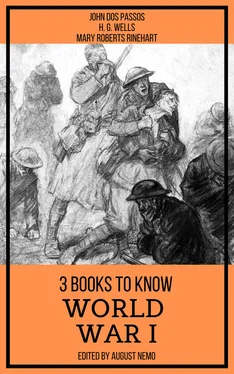When the company was dismissed, he went up familiarly to the top sergeant:
“Say, Sarge, doin' anything this evenin'?”
“What the hell can a man do when he's broke?” said the top sergeant.
“Well, you come down town with me. I want to introjuce you to somebody.”
“Great!”
“Say, Sarge, have they sent that appointment in yet?”
“No, they haven't, Fuselli,” said the top sergeant. “It's all made out,” he added encouragingly.
They walked towards the town silently. The evening was silvery-violet. The few windows in the old grey-green houses that were lighted shone orange.
“Well, I'm goin' to get it, ain't I?”
A staff car shot by, splashing them with mud, leaving them a glimpse of officers leaning back in the deep cushions.
“You sure are,” said the top sergeant in his good-natured voice.
They had reached the square. They saluted stiffly as two officers brushed past them.
“What's the regulations about a feller marryin' a French girl?” broke out Fuselli suddenly.
“Thinking of getting hitched up, are you?”
“Hell, no.” Fuselli was crimson. “I just sort o' wanted to know.”
“Permission of C. O., that's all I know of.”
They had stopped in front of the grocery shop. Fuselli peered in through the window. The shop was full of soldiers lounging against the counter and the walls. In the midst of them, demurely knitting, sat Yvonne.
“Let's go and have a drink an' then come back,” said Fuselli.
They went to the cafe where Marie of the white arms presided. Fuselli paid for two hot rum punches.
“You see it's this way, Sarge,” he said confidentially, “I wrote all my folks at home I'd been made corporal, an' it'ld be a hell of a note to be let down now.”
The top sergeant was drinking his hot drink in little sips. He smiled broadly and put his hand paternal-fashion on Fuselli's knee.
“Sure; you needn't worry, kid. I've got you fixed up all right,” he said; then he added jovially, “Well, let's go see that girl of yours.”
They went out into the dark streets, where the wind, despite the smell of burnt gasolene and army camps, had a faint suavity, something like the smell of mushrooms; the smell of spring.
Yvonne sat under the lamp in the shop, her feet up on a box of canned peas, yawning dismally. Behind her on the counter was the glass case full of yellow and greenish-white cheeses. Above that shelves rose to the ceiling in the brownish obscurity of the shop where gleamed faintly large jars and small jars, cans neatly placed in rows, glass jars and vegetables. In the corner, near the glass curtained door that led to the inner room, hung clusters of sausages large and small, red, yellow, and speckled. Yvonne jumped up when Fuselli and the sergeant opened the door.
“You are good,” she said. “Je mourrais de cafard.” They laughed.
“You know what that mean—cafard?”
“Sure.”
“It is only since the war. Avant la guerre on ne savais pas ce que c'etait le cafard. The war is no good.”
“Funny, ain't it?” said Fuselli to the top sergeant, “a feller can't juss figure out what the war is like.”
“Don't you worry. We'll all get there,” said the top sergeant knowingly.
“This is the sarjon, Yvonne,” said Fuselli.
“Oui, oui, je sais,” said Yvonne, smiling at the top sergeant. They sat in the little room behind the shop and drank white wine, and talked as best they could to Yvonne, who, very trim in her black dress and blue apron, perched on the edge of her chair with her feet in tiny pumps pressed tightly together, and glanced now and then at the elaborate stripes on the top sergeant's arm.
Fuselli strode familiarly into the grocery shop, whistling, and threw open the door to the inner room. His whistling stopped in the middle of a bar.
“Hello,” he said in an annoyed voice.
“Hello, corporal,” said Eisenstein. Eisenstein, his French soldier friend, a lanky man with a scraggly black heard and burning black eyes, and Stockton, the chalky-faced boy, were sitting at the table that filled up the room, chatting intimately and gaily with Yvonne, who leaned against the yellow wall beside the Frenchman and showed all her little pearly teeth in a laugh. In the middle of the dark oak table was a pot of hyacinths and some glasses that had had wine in them. The odor of the hyacinths hung in the air with a faint warm smell from the kitchen.
After a second's hesitation, Fuselli sat down to wait until the others should leave. It was long after pay-day and his pockets were empty, so he had nowhere else to go.
“How are they treatin' you down in your outfit now?” asked Eisenstein of Stockton, after a silence.
“Same as ever,” said Stockton in his thin voice, stuttering a little.... “Sometimes I wish I was dead.”
“Hum,” said Eisenstein, a curious expression of understanding on his flabby face. “We'll be civilians some day.”
“I won't” said Stockton.
“Hell,” said Eisenstein. “You've got to keep your upper lip stiff. I thought I was goin' to die in that troopship coming over here. An' when I was little an' came over with the emigrants from Poland, I thought I was goin' to die. A man can stand more than he thinks for.... I never thought I could stand being in the army, bein' a slave like an' all that, an' I'm still here. No, you'll live long and be successful yet.” He put his hand on Stockton's shoulder. The boy winced and drew his chair away. “What for you do that? I ain't goin' to hurt you,” said Eisenstein.
Fuselli looked at them both with a disgusted interest.
“I'll tell you what you'd better do, kid,” he said condescendingly. “You get transferred to our company. It's an Al bunch, ain't it, Eisenstein? We've got a good loot an' a good top-kicker, an' a damn good bunch o' fellers.”
“Our top-kicker was in here a few minutes ago,” said Eisenstein.
“He was?” asked Fuselli. “Where'd he go?”
“Damned if I know.”
Yvonne and the French soldier were talking in low voices, laughing a little now and then. Fuselli leaned back in his chair looking at them, feeling out of things, wishing despondently that he knew enough French to understand what they were saying. He scraped his feet angrily back and forth on the floor. His eyes lit on the white hyacinths. They made him think of florists' windows at home at Eastertime and the noise and bustle of San Francisco's streets. “God, I hate this rotten hole,” he muttered to himself. He thought of Mabe. He made a noise with his lips. Hell, she was married by this time. Anyway Yvonne was the girl for him. If he could only have Yvonne to himself; far away somewhere, away from the other men and that damn frog and her old mother. He thought of himself going to the theatre with Yvonne. When he was a sergeant he would be able to afford that sort of thing. He counted up the months. It was March. Here he'd been in Europe five months and he was still only a corporal, and not that yet. He clenched his fists with impatience. But once he got to be a non-com it would go faster, he told himself reassuringly.
He leaned over and sniffed loudly at the hyacinths.
“They smell good,” he said. “Que disay vous, Yvonne?”
Yvonne looked at him as if she had forgotten that he was in the room. Her eyes looked straight into his, and she burst out laughing. Her glance had made him feel warm all over, and he leaned back in his chair again, looking at her slender body so neatly cased in its black dress and at her little head with its tightly-done hair, with a comfortable feeling of possession.
“Yvonne, come over here,” he said, beckoning with his head. She looked from him to the Frenchman provocatively. Then she came over and stood behind him.
Читать дальше












